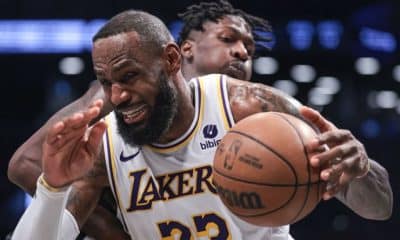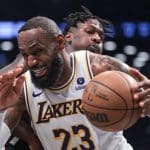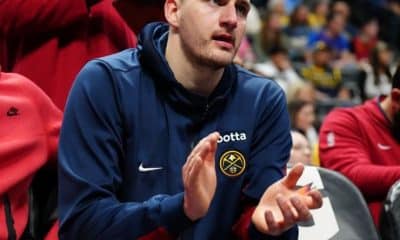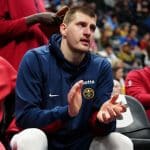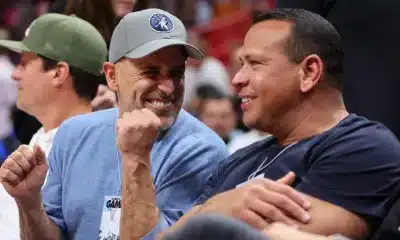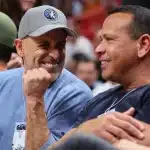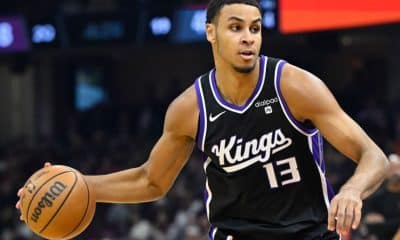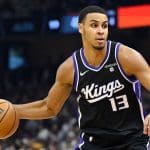NBA
Trouble from the Top Down in New York
The Knicks are a troubled franchise, which stems from the top of the organization, writes Tommy Beer.
After over six months of silence, Phil Jackson finally spoke with the media last week. During his nearly hour-long press conference, Jackson addressed a broad range of issues. Many of them have been covered in depth, including his startling assessment of Carmelo Anthony and Melo’s future in New York, as well as his admission that he plans to take a more hands-on approach in practices next season.
However, one topic that hasn’t been discussed much was Jackson alluding to, on numerous occasions, how the system he is running with the Knicks is similar to that of the San Antonio Spurs and the NFL’s New England Patriots.
When asked about the Triangle, Phil’s meandering answer eventually led to him discussing current dynastic franchises and the men responsible for running them. Jackson explained that he believes it’s crucial to have a trusted template when you “build a system of anything.”
Jackson elaborated on this point.
“It’s no wonder the Spurs can have some success continuing their action,” Jackson said. “Or the Patriots can have success, because they can put people in places. We could do that with the Bulls and the Lakers. … You can have something that’s concrete.”
“Whether it’s teams that I have coached or Belichick, there is an identifiable way in which they play. When you develop that system so that people are all on board with that system, then you have something that’s concrete. A format.”
It all made sense, especially coming from one of the greatest coaches in NBA history. However, Phil is no longer a coach, which is part of the reason why his comments missed the mark. Also, the premise of his argument was off-base as well.
One of the keys to success for the Patriots under Bill Belichick has been Belichick’s willingness to adapt his game plan, on both sides of the ball, to his personnel. Belichick has never been chained to one particular approach, dating all the way back to his days as defensive coordinator with the Giants under Bill Parcells, when Belichick was able to slow down the Buffalo Bills’ seemingly unstoppable K-Gun offense in Super Bowl XXV.
Obviously, Belichick had to employ a different strategy to defeat the Rams (“Greatest Show on Turf”) in 2001 than he did to beat the Seahawks in 2014. The Pats have switched from a base 3-4 to a 4-3 defense and back on numerous occasions during the Belichick era.
Time and time again, Bill Belichick has adapted his schemes to match his personnel on offense and defense.
Obviously, Tom Brady has been indispensable for Belichick and the Pats in much the same way Tim Duncan was for Gregg Popovich and the Spurs during Duncan’s illustrious career.
However, even when a knee injury sidelined Brady for the entire 2008 campaign, Matt Cassel was named the starting quarterback and the Pats still managed to win 11 games that season. Of course, Belichick had to run a far different offense with Cassel under center than when Brady was taking snaps.
On a similar note, Tim Duncan was a shell of himself by his final NBA season in 2015-16. Duncan averaged just 8.6 points, but the Spurs still went on to win a franchise-record 67 games in the regular season. And, after Duncan retired last summer, the Spurs came back and once again cracked the 60-win plateau in 2016-17. Pop could no longer dump the ball down low to an all-time great in Duncan. Popovich was forced to modify his attack and did so quite successfully.
The juxtaposition of the Knicks and the Spurs is an easier ‘apples-to-apples’ comparison for obvious reasons. And comparing these two franchises allows us to make a dramatic contrast, which predates Phil Jackson, and shows why Knicks fans shouldn’t be overly surprised that the Zen Master experiment has been a disaster.
*****
The Knicks and Spurs squared off in the 1999 NBA Finals. That series ended on June 25th, 1999, with the Spurs capturing the crown by winning Game 5 at Madison Square Garden. Since that day, the two franchises have gone in completely divergent directions.
Starting with each team’s next game, which was opening night of the 1999-2000 season, the Spurs have compiled a regular-season record of 1,040-420. Yes, that’s 620 games over .500, which equates to a .712 winning percentage.
The Knicks, on the other hand, are 208 games under .500 at 626-834.
The Spurs have won 136 playoff games (and counting) and four NBA championships over that same time frame.
The Knicks, on the other hand, have won only of three postseason series and a total of 18 playoff games since the turn of the century.
The Spurs have won at least 50 games several times and qualified for the playoffs every single season since 1999.
The Knicks have won over 50 games just once.
*****
Pinning the Knicks struggles solely on Phil Jackson would be a mistake. There is a systemic dysfunction plaguing the Knicks that can be traced back to the change in ownership. Since Jim Dolan seized control of the team, the Knickerbockers have been a laughingstock, generating far more attention from missteps on and off the court than any success they have had between the lines.
With Gregg Popovich and General Manager R.C. Buford running the ship in San Antonio for owner Peter Holt, the focus of the franchise has been winning ball games. No more, no less. No sideshows. No circus attractions. You know what didn’t happen in San Antonio this season? Buford didn’t use Twitter to insult his team’s top scorer. Holt didn’t feud with a beloved former player and have said player arrested and escorted out of his home arena in handcuffs, only to then to make accusations of alcoholism. When’s the last time Holt interfered with trade negotiations and overruled Pop and Buford? Dolan has, which resulted in the Knicks giving away the farm for Carmelo Anthony and a first-round pick for Andrea Bargnani.
The Knicks have been awful for the last three seasons, but they have also been brutally bad and mostly unwatchable for the 15 prior seasons as well. There is one common denominator spanning those 18 years of futility.
Success, or failure, starts at the top.
Each season, ESPN puts out a management ranking, which rates executives of each franchise from top to bottom (team presidents, vice presidents and general managers). In 2017, once again, Popovich and Buford finished first. The Knicks (Jackson and Steve Mills) finished 29th. In the overall rankings, which includes ownership, management and coaching, the Spurs ranked first, and the Knicks were dead last.
*****
While Dolan’s culpability is undeniable, that doesn’t mean we should let Phil off the hook.
Dolan, recognizing past mistakes, announced publicly that he would be completely “hands off” when he hired Jackson.
“I am by no means an expert in basketball. I’m a fan, but my expertise lies in managing companies and businesses,” said Dolan on the day he introduced Jackson. “So I think I’m a little out of my element when it comes to the team. I found myself in a position where I needed to be more a part of the decision-making for a while. It wasn’t necessarily something that I wanted to do, but as chairman of the company, I felt obligated to do.”
Dolan has stuck to his word. However, since taking control of the decision-making in the organization, Phil has let his ego get in the way of the team’s advancement, which brings us back to Friday’s press conference.
Phil alienated current players and fans alike with his inflammatory comments, in addition to referencing the Patriots and Spurs.
It would be one thing if Phil were on the frontlines as the head coach installing this system with a group of talented players that were willing to buy into it. Instead, he’s attempting to pull strings from his office or 15 rows behind the bench. For three straight seasons, the team’s best players have rebelled, and now two coaches have been coerced to go against their preferred strategies to implement something they’re not entirely comfortable with.
What if, back in Chicago in the 1990’s, Bulls General Manager Jerry Krause had informed Phil that he had to ditch The Triangle and run more pick-and-rolls if he wanted to keep his job? How would Jackson have responded? How would Jordan and Pippen have felt, unsure if it was their coach or GM that was deciding how they would run their offense? Obviously, this is an untenable situation.
Jackson does share something in common with Bill Belichick and Gregg Popovich nowadays. All three are antagonistic towards the media. The difference is Pop and Belichick have recently earned rings and racked up plenty of wins on the sidelines this decade.
Phil comes across as dismissive despite the fact that his team has lost 166 games over the last three seasons.
In addition, Belichick and Popovich have thrived in recent years because they have been so willing to embrace change and tweak their approach based on personnel, as opposed to forcing the personnel they have to fit into a rigid system.
Popovich promotes a culture of culpability but is not married to a particular brand of basketball. Earlier this month in this space, we discussed the problems inherent in attempting to win in today’s NBA by relying solely on Triangle principles. Well, one of the rare teams that are successful in the modern day NBA without being overly reliant on the three-point shot is the San Antonio Spurs. They do lead the NBA in three-point percentage, but they don’t mind getting LaMarcus Aldridge or Kawhi Leonard open looks in the mid-range area. Still, the Spurs have proven they can win with their current roster composition and offensive approach. That’s primarily because they have always been a defense-first organization. That’s what they remain committed to, through thick and thin. Furthermore, it is important to note that when the Spurs won their most recent title back in 2014, Pop’s team averaged 23.6 3-point attempts per game during the Finals, which set a record for the most long-range attempts by any champion in NBA history.
The last time the Knicks finished near the top of the league in three-point attempts was 2012-13, which just happens to be the year they won 54 games and advanced to the second-round of the postseason. The last time the Knicks were committed to defense and made that the focal point of their franchise was back when Patrick Ewing roamed the paint. Those Knicks teams advanced to the playoffs every single season from 1987 through 2000.
The Knicks’ recent past is littered with losses, and the organization is in trouble moving forward as well. That trouble starts at the top. Unfortunately, it’s difficult to envision either Jim Dolan or Phil Jackson doing what is necessary to remedy the situation and lead the franchise back to respectability.
Add Basketball Insiders to your Google News Feed!
-
Main Page 1 week ago
LeBron James joins Michael Jordan as only NBA players with multiple 40-point games after turning 39
-
Main Page 1 week ago
Nikola Jokic 1st NBA player since Oscar Robertson with 26+ points, 18+ rebounds, & 16+ assists in a game
-
NBA 1 week ago
Ex-MLB star Alex Rodriguez vows to keep trying to buy Timberwolves franchise despite rejection
-
Main Page 1 week ago
Kings are 14-5 this season when Keegan Murray scores 19+ points
